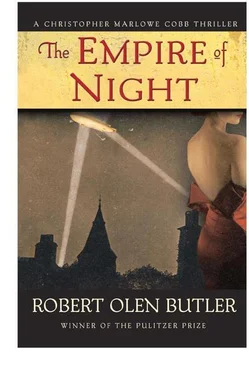“Good,” Ziegler said. “Here’s Major Dettmer.”
We were passing the forward gondola, and ahead, standing in the center of the rails, arms akimbo, darkly silhouetted against the tall corridor of morning light at the open doors, was the commander of LZ 78.
We approached. He turned and took a step toward us, his face suddenly rendering itself, in the light from the windows, into clean-shaven, cleft-chinned stolidity.
He saluted us both.
Ziegler introduced me. And he explained me: “Colonel Wolfinger represents the Foreign Office. They have interceded about the civilian.”
Dettmer’s eyes cut instantly in my direction.
“He won’t be flying with you,” I said.
I patted my dispatch case, as if the written order for that was inside. I wanted the major to take note of the case so when I needed access to his airship, he would not question its presence over my shoulder.
I paused to let Major Dettmer reply if he wished.
He realized I was waiting.
He said, “It was not my idea to bring him, sir.”
I smiled at him. “I did not imagine it was.”
“I have clear instructions about his bomb,” he said. “We do not need his presence to drop it where they wish.”
To demonstrate my authority and validate my identity, I’d played the safest cards in my deck of deductions so far. I took a little gamble with one now.
“They do still light their theaters at night,” I said.
Dettmer smiled.
I was right about the target.
“I would like to see you off,” I said. “To see for myself that the bomb is secure,” I said.
“Yes sir,” he said.
“They have given you special handling instructions, I presume.”
“They have.”
“Have they told you why?”
I sensed Ziegler stiffen beside me. He’d answered this question already. I was checking up on him.
“We have speculated,” Dettmer said.
Ziegler said, sharply, “He asked if they told you its specialness, Major. Not if you have a speculation.”
Dettmer looked at his colonel and then back to me. “I’m sorry, sir. No, sir. They have told us only how to handle the bomb.”
I said, “But that clearly suggests something to you, speculative though your thoughts may be.”
He looked at his colonel once more.
I turned to Ziegler. I let him off the hook, mercy being as intimidating an assertion of power as severity. “You quite properly answered the question that I asked, Colonel. I am now asking for your speculation.”
Ziegler said, “We assume the bomb contains a poison gas.”
“Do you accept a war of terror upon a civilian population, Colonel?”
He straightened. But he was not composed. He had no idea what I expected him to say.
“I follow orders,” he said.
“And you, Major?” I turned to him.
“Yes sir.”
“Follow your instructions carefully with this device, gentlemen. We obey. We do our duty. All of us. As we must.”
Including myself in the invocation of duty, I was reminded of the weather. How its fickleness could test that duty. Once I’d dealt with Stockman and planted the bomb, the Zeppelin had to fly.
And then I had a thought.
I turned to Ziegler.
“This matter of the weather,” I said. “Once armed, this special bomb becomes even more dangerous. We should abort the mission only under extreme circumstances.”
Ziegler did not reply.
I looked at the major. He was standing at attention.
The burden, the dangers, of what I was suggesting would fall on him.
Too bad.
And then my brain caught up with a thing I had been shunting aside, a thing I’d learned some months ago to shunt aside. I thought of the men I have killed, the men I had yet to kill, in doing my duty.
Unless I failed in my own mission, the man standing before me would not have to brave a flight into bad weather this evening.
He would be dead.
He and his whole crew.
By my dutiful hand.
I shunted this aside again.
I said, “This special bomb is very volatile. We do not wish to poison the air base and all of Spich.”
“No sir,” Ziegler said, his voice thick with what sounded like misery.
I looked at him.
This did not resemble war as he’d known it, as he’d relished it, for his long career. Not in any way.
I turned back to Major Dettmer. “I will not ask you to attack London if the weather is against you. But you must at least fly to the Strait of Dover or the North Sea and dispose of the thing. You must fly. Do you both understand?”
The commander of the LZ 78 executed a very slow, very precise salute and held it.
He was a good soldier.
This was necessary work, my work here. He was such a good soldier that he would otherwise poison London from his goodness. My work was necessary. Wretchedly so.
I looked at the colonel.
I lifted my chin slightly.
He snapped into a quick salute, also holding it at his temple.
I saluted them both.
And that was that.
Jeremy was waiting in what had become our place in the Boar’s Head bar, the marble-top table in the far corner. He’d left me my preferred chair with its back to the wall. The man noticed things.
I sat.
He nodded.
I nodded.
The innkeeper arrived beside us. Before we ordered a little early lunch, I said to her, “I will receive a phone call this afternoon around three o’clock. I will be sitting here. Please find me. I want to speak to the man personally.”
“Yes sir,” she said, with the crisp snap of ingrained obedience, which seemed to be as natural a manner for Germany’s women innkeepers as for its career army officers.
Then her face flashed into thoughtfulness and instantly into revelation. She’d just remembered something.
She looked to Jeremy. I looked with her.
He was sitting stiffly upright, playing the Foreign Office major.
“Did you find your telegram?” she asked.
He did a minute shift of his head sideways. A Cracker Jack flip book of a boxer’s feint.
She went instantly on. “I knocked, but you didn’t answer. I slipped it under your door.”
“I did find it,” Jeremy said. “Thank you.”
He glanced at me, then back to her.
Jeremy and I ordered. She went away.
He turned to me, and I didn’t have to ask.
He said, “The groups we must work with inside Germany — the Republikaner particularly — we’ve used their help for this, their resources, their bomb, and they feel invested in it. I’m obligated to stay in touch with them.”
“Do they know of the special nature of the threat?”
That minuscule feint again. As if I’d just thrown a left-hand jab. But then immediately he said, “Not at all. We keep them informed. But only as much as we want them to know. To them, we’re simply bursting balloons.”
I figured I knew why he felt like dodging when the Republikaners came up. “You not real comfortable with those boys?”
He smiled at me. “You don’t miss much,” he said.
“It’s their bomb but none of their business.”
“Precisely.”
“We okay for this?’”
“We’re okay,” he said. “And as to the pin for this particular balloon, everything is ready but the hour.”
He still needed to set the clock on the time bomb he’d been assembling while I was at the air base.
“The bomb was one of the resources provided by the Republikaner ,” he said.
“Make it five minutes after five,” I said. This was guesswork. How prompt would they be? Ziegler had stressed the importance of that hour to make it to the target on schedule. These were Germans. Their trains ran precisely. All this whistled through me quickly and I said, “No. Let’s give ourselves a little more margin. The Zepps climb slowly anyway. Seven after five.”
Читать дальше












